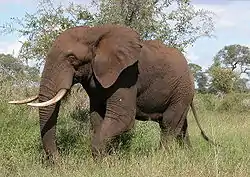elefante
Asturian
Etymology
Borrowed from Latin elephantem, accusative of elephans, from Ancient Greek ἐλέφᾱς (eléphās). Cognates include Spanish elefante and Portuguese elefante.
Basque
Etymology
(This etymology is missing or incomplete. Please add to it, or discuss it at the Etymology scriptorium. Particularly: “From Spanish or directly from Latin?”)
Pronunciation
- IPA(key): /elefante/, [e̞.le̞.fãn̪.t̪e̞]
Audio (file)
Declension
| indefinite | singular | plural | |
|---|---|---|---|
| absolutive | elefante | elefantea | elefanteak |
| ergative | elefantek | elefanteak | elefanteek |
| dative | elefanteri | elefanteari | elefanteei |
| genitive | elefanteren | elefantearen | elefanteen |
| comitative | elefanterekin | elefantearekin | elefanteekin |
| causative | elefanterengatik | elefantearengatik | elefanteengatik |
| benefactive | elefanterentzat | elefantearentzat | elefanteentzat |
| instrumental | elefantez | elefanteaz | elefanteez |
| inessive | elefanterengan | elefantearengan | elefanteengan |
| locative | — | — | — |
| allative | elefanterengana | elefantearengana | elefanteengana |
| terminative | elefanterenganaino | elefantearenganaino | elefanteenganaino |
| directive | elefanterenganantz | elefantearenganantz | elefanteenganantz |
| destinative | elefanterenganako | elefantearenganako | elefanteenganako |
| ablative | elefanterengandik | elefantearengandik | elefanteengandik |
| partitive | elefanterik | — | — |
| prolative | elefantetzat | — | — |
Classical Nahuatl
Alternative forms
- elepante (obsolete)
Corsican

Alternative forms
Etymology
Borrowed from Latin elephantem, accusative of elephas, from Ancient Greek ἐλέφᾱς (eléphās). Cognates include Italian elefante and Spanish elefante.
Pronunciation
- IPA(key): /eleˈfãnte/
References
- “elefante, elefente” in INFCOR: Banca di dati di a lingua corsa
Galician
Alternative forms
- alefante
Etymology
Attested since the 14th century. From Old Galician-Portuguese [Term?], borrowed from Latin elephās, elephantis (“elephant”), from Ancient Greek ἐλέφᾱς (eléphās, “elephant, ivory”).
Pronunciation
- IPA(key): /ɛleˈfante̝/
References
- “elifante” in Dicionario de Dicionarios do galego medieval, SLI - ILGA 2006–2022.
- “elefante” in Xavier Varela Barreiro & Xavier Gómez Guinovart: Corpus Xelmírez - Corpus lingüístico da Galicia medieval. SLI / Grupo TALG / ILG, 2006–2018.
- “alyfante” in Xavier Varela Barreiro & Xavier Gómez Guinovart: Corpus Xelmírez - Corpus lingüístico da Galicia medieval. SLI / Grupo TALG / ILG, 2006–2018.
- “elefante” in Dicionario de Dicionarios da lingua galega, SLI - ILGA 2006–2013.
- “elefante” in Tesouro informatizado da lingua galega. Santiago: ILG.
- “elefante” in Álvarez, Rosario (coord.): Tesouro do léxico patrimonial galego e portugués, Santiago de Compostela: Instituto da Lingua Galega.
Italian
Etymology
Borrowed from Latin elephantem, from Ancient Greek ἐλέφας (eléphas), from Mycenaean Greek 𐀁𐀩𐀞 (e-re-pa), from a compound of Berber *eḷu and either Egyptian ꜣbw or Sanskrit इभ (íbha).
Pronunciation
- IPA(key): /e.leˈfan.te/
- Rhymes: -ante
- Hyphenation: e‧le‧fàn‧te
Derived terms
Descendants
- → Sicilian: lifanti (or inherited from Latin)
Further reading
 elefante on the Italian Wikipedia.Wikipedia it
elefante on the Italian Wikipedia.Wikipedia it
Latin
Portuguese

Alternative forms
- elephante (obsolete)
Etymology
From Old Galician-Portuguese (h)elefante, elifante, borrowed from Latin elephantis (“elephant”), from Ancient Greek ἐλέφᾱς (eléphās, “elephant, ivory”).
Pronunciation
- (Brazil) IPA(key): /e.leˈfɐ̃.t͡ʃi/
- (Southern Brazil) IPA(key): /e.leˈfɐ̃.te/
- (Portugal) IPA(key): /i.lɨˈfɐ̃.t(ɨ)/
- Rhymes: (Portugal) -ɐ̃tɨ, (Brazil) -ɐ̃tʃi
- Hyphenation: e‧le‧fan‧te
Derived terms
Related terms
Descendants
- Papiamentu: elefante
Spanish
Etymology
From various Old Spanish forms like elifant, alefant and eleofant, all ultimately from Latin elephās, elephāntis, from Ancient Greek ἐλέφας (eléphas).
Pronunciation
- IPA(key): /eleˈfante/ [e.leˈfãn̪.t̪e]
Audio (Colombia) (file) - Rhymes: -ante
- Syllabification: e‧le‧fan‧te
Derived terms
Descendants
Further reading
- “elefante”, in Diccionario de la lengua española, Vigésima tercera edición, Real Academia Española, 2014